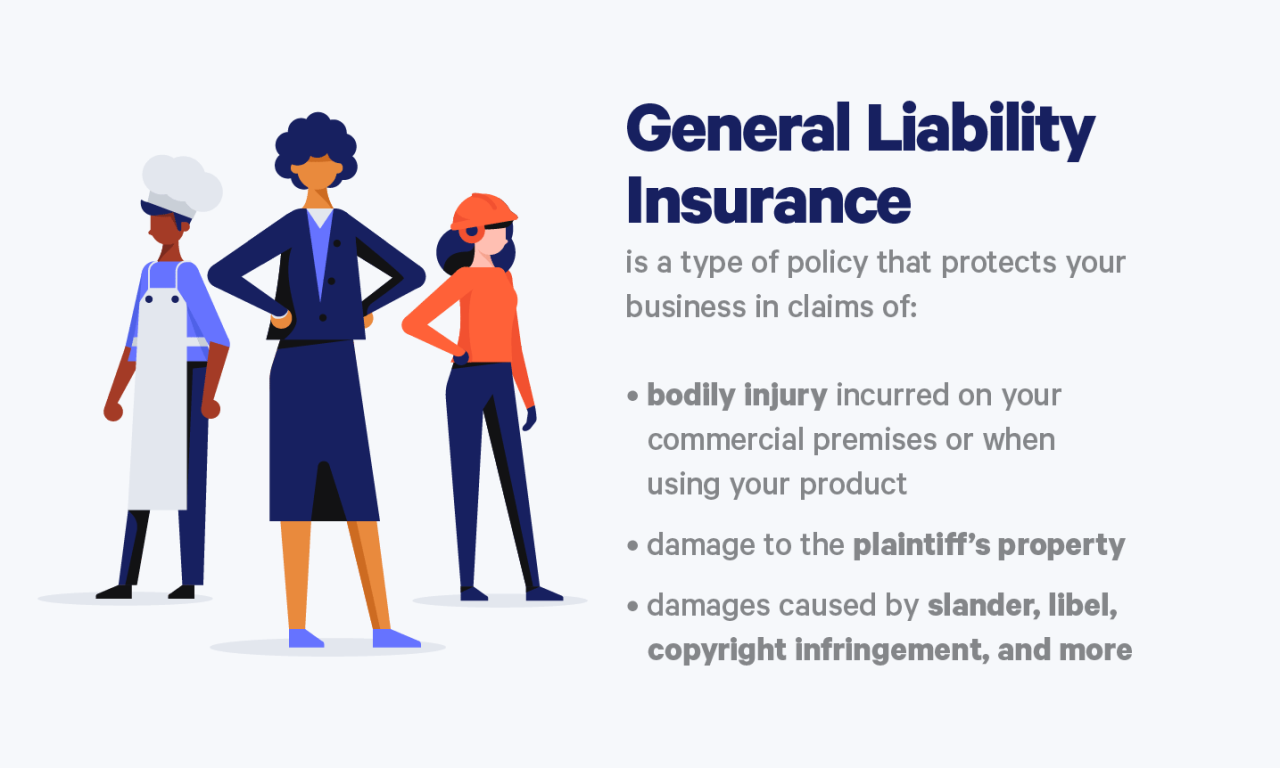Liability insurance for business is an essential tool for safeguarding your company from financial ruin. It acts as a safety net, shielding you from the potentially devastating costs of lawsuits, accidents, and other unforeseen events. Whether you’re a small startup or a large corporation, understanding the importance of liability insurance is crucial for your business’s long-term success.
Imagine this: a customer trips and falls in your store, injuring themselves. Or, a product you manufacture causes damage to a consumer’s property. These scenarios, while seemingly unlikely, can easily lead to expensive lawsuits that could cripple your business. Liability insurance provides financial protection, covering legal fees, settlements, and other related expenses, allowing you to focus on your core operations without the fear of financial devastation.
Resources for Obtaining Liability Insurance

Finding the right liability insurance policy for your business is crucial, but navigating the world of insurance providers and policy options can be overwhelming. This section provides guidance on where to find reputable insurance providers and how to secure the best coverage for your unique needs.
Reputable Insurance Providers for Businesses
A wide range of insurance companies offer liability insurance policies specifically tailored for businesses. Choosing a reputable provider is essential to ensure reliable coverage and timely claims processing. Here are some well-known and respected insurance providers:
- The Hartford: Known for its comprehensive business insurance solutions, including general liability, professional liability, and workers’ compensation.
- Chubb: Offers a wide range of commercial insurance products, with a focus on customized solutions for various industries.
- Travelers: Provides a broad range of insurance products, including liability insurance for businesses of all sizes.
- Liberty Mutual: Offers competitive rates and a wide range of coverage options for businesses.
- State Farm: Provides a range of insurance products, including general liability insurance for small businesses.
Tips for Finding the Best Insurance Policy
Finding the right liability insurance policy involves more than simply choosing a provider. You need to consider your specific business needs, potential risks, and budget to find the best fit. Here are some valuable tips:
- Identify Your Business Risks: Thoroughly assess your business operations to identify potential risks, such as customer injuries, property damage, or professional negligence. This will help you determine the types of coverage you need.
- Consider Your Budget: Liability insurance premiums can vary significantly based on factors such as your industry, business size, and risk profile. Set a realistic budget and look for policies that offer the necessary coverage within your financial constraints.
- Compare Quotes from Multiple Providers: Don’t settle for the first quote you receive. Compare quotes from at least three different insurance providers to ensure you’re getting the best value for your money.
- Read the Policy Carefully: Before signing any policy, carefully review the terms and conditions to understand your coverage, exclusions, and limitations. Ask questions if you’re unsure about anything.
- Seek Professional Advice: Consult with an insurance broker or agent who specializes in business insurance. They can help you understand your options and find a policy that meets your specific needs.
Importance of Comparing Quotes from Multiple Providers
Comparing quotes from multiple insurance providers is crucial for finding the best value for your money. Different providers may offer varying rates, coverage options, and policy terms. By comparing quotes, you can:
- Identify the Most Competitive Rates: Different providers may offer different rates based on their risk assessments and underwriting practices. Comparing quotes allows you to find the most competitive rates for your specific needs.
- Compare Coverage Options: Each provider may offer different coverage options, including limits, deductibles, and exclusions. By comparing quotes, you can ensure you’re getting the coverage you need at a reasonable price.
- Evaluate Policy Terms and Conditions: Insurance policies can have complex terms and conditions. Comparing quotes allows you to review different policy terms and find the most favorable conditions for your business.
Liability Insurance and the Future of Business
The landscape of liability insurance is rapidly evolving, driven by technological advancements, changing risk profiles, and evolving legal and regulatory environments. These changes present both challenges and opportunities for businesses as they navigate the future of risk management.
Emerging Trends in Liability Insurance
The evolving risk landscape is shaping the trends in liability insurance. Businesses are facing new and complex risks, such as cyberattacks, data breaches, and social media liability, which traditional insurance policies may not adequately cover. In response, insurers are developing specialized policies and coverage options to address these emerging risks.
- Cybersecurity Insurance: As cyberattacks become more sophisticated and prevalent, cybersecurity insurance is gaining importance. These policies cover losses resulting from data breaches, ransomware attacks, and other cyber incidents.
- Social Media Liability Insurance: Businesses are increasingly exposed to risks associated with social media, including defamation, copyright infringement, and privacy violations. Social media liability insurance provides coverage for such risks.
- Artificial Intelligence (AI) Liability Insurance: The rapid adoption of AI technologies raises new liability concerns. AI liability insurance is emerging to cover potential risks associated with AI-powered systems, such as algorithmic bias and autonomous vehicle accidents.
The Role of Technology in Liability Insurance
Technology is playing a transformative role in the future of liability insurance. Insurers are leveraging technology to improve efficiency, enhance customer experiences, and develop innovative risk management solutions.
- Data Analytics: Insurers are using data analytics to better understand risk profiles, predict potential claims, and personalize insurance policies. This allows them to offer more accurate and competitive pricing.
- Artificial Intelligence (AI): AI is being used to automate tasks, improve fraud detection, and develop predictive models for risk assessment. AI-powered chatbots and virtual assistants are also being used to provide 24/7 customer support.
- Internet of Things (IoT): IoT devices are generating vast amounts of data that can be used to monitor risks and prevent accidents. Insurers are leveraging IoT data to offer risk-based pricing and personalized insurance policies.
Challenges and Opportunities for Businesses, Liability insurance for business
Businesses need to adapt to these emerging trends in liability insurance to effectively manage their risk exposures.
- Staying Ahead of Emerging Risks: Businesses need to stay informed about emerging risks and ensure their insurance policies provide adequate coverage. This requires proactive risk assessment and ongoing dialogue with insurance brokers.
- Leveraging Technology: Businesses can leverage technology to improve their risk management practices and reduce their insurance costs. This includes implementing cybersecurity measures, adopting data analytics tools, and using AI-powered risk assessment solutions.
- Building Strong Relationships with Insurers: Building strong relationships with insurance brokers and insurers is crucial for obtaining the right coverage and negotiating favorable terms. This requires open communication, transparency, and a clear understanding of the business’s risk profile.
Conclusive Thoughts: Liability Insurance For Business
In conclusion, liability insurance is a vital investment for any business. It provides peace of mind and financial protection against the unexpected, allowing you to focus on your core business operations without the worry of potentially crippling lawsuits. By carefully considering your business’s specific needs, choosing the right coverage, and implementing sound risk management practices, you can ensure that your company is well-protected and prepared for any challenges that may arise.
Liability insurance is a crucial aspect of any business, protecting you from financial losses due to claims of negligence or wrongdoing. While many companies focus on traditional business insurance, it’s worth exploring options like colonial penn life insurance company for potential coverage needs.
Their offerings might provide a unique perspective on liability protection, ensuring your business is well-prepared for unforeseen circumstances.
